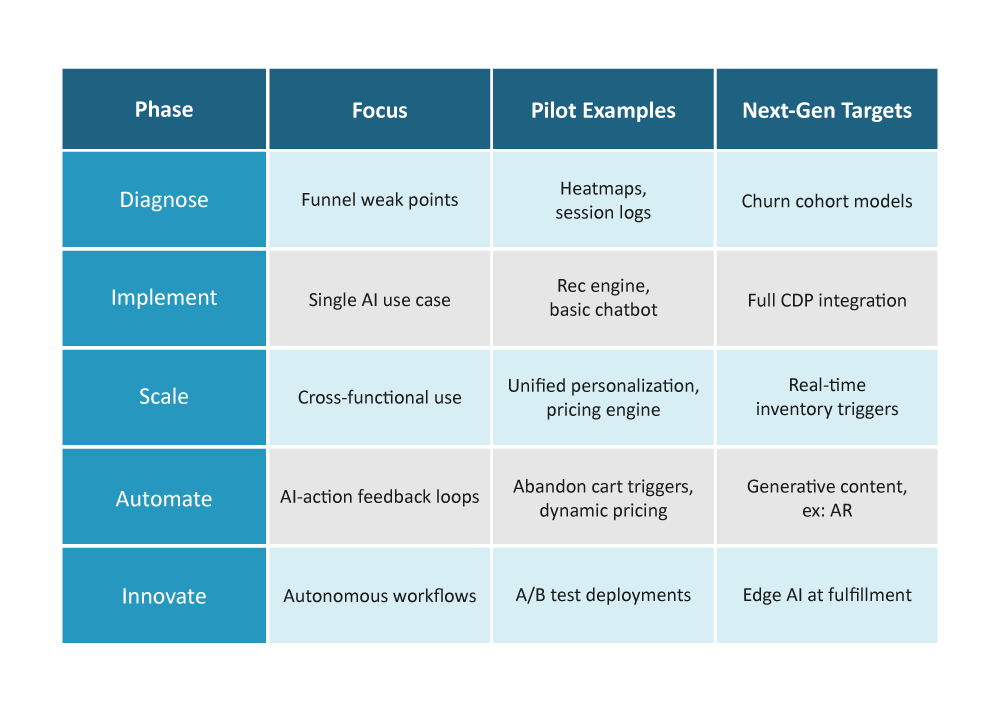The rise of artificial intelligence in ecommerce: From personalization to fulfillment

Highlights:
- AI-driven personalization lifts AOV and curbs cart abandonment.
- AR, shoppable video, and voice power immersive product discovery.
- Predictive supply chains slash stock-outs and fulfillment costs.
- Real-time dynamic pricing protects margins and ups revenue.
- Smart chatbots convert always-on support into data-rich sales.
- Adaptive fraud defense and ethical AI safeguard customer trust.
As technology leaps forward, artificial intelligence in ecommerce has evolved from novelty to necessity. AI-powered capabilities—from real-time personalization and inventory forecasting to dynamic pricing and automated support—are fundamentally reshaping the way online stores operate and compete. Today, AI isn’t just an add-on; it’s the new operating system enabling ecommerce with AI to deliver higher efficiency, tailored experiences, and superior customer engagement.
For modern retailers, embracing artificial intelligence in e business means more than deploying a chatbot; it means reframing entire operational models so that AI influences decisions across areas like product merchandising, customer service, logistics, and data-driven strategy.
Next-gen personalization: Precision at scale
AI driven personalization systems ingest vast data streams—browsing behavior, time-on-page, ratings, returns—to recommend the exact product a customer is most likely to buy.
Deep dive:
- Machine learning models: These systems continuously retrain using feature-rich datasets, including session duration, cross-category journeys, and propensity scores.
- Hybrid systems: Brands like Stitch Fix combine human stylists with algorithmic matching, achieving both authenticity and scale.
- ROI: AI-powered personalization can boost average order value by 10–30%, while reducing churn and abandoned carts.
In practice, artificial intelligence in ecommerce shifts personalization from intuition to precision, consistently delivering the “right thing, for the right person, at the right time.”
Immersive content & interactive discovery
AI-enabled content tools go beyond recommendations to create immersive commerce:
- Augmented reality try-ons: Sephora’s AR mirrors create virtual makeup previews, boosting conversion up to 90% in engaged users.
- Shoppable video: Taobao’s AI-generated video demos have increased click-through rates by over 30%.
- Voice-activated search: AI speech recognition enables shoppers to find products by describing attributes like style, color, or use case.
This seamless blend of visual storytelling, audio cues, and interactive overlays anchors ecommerce with AI in the emotional terrain of decision-making, making browsing feel less transactional and more like discovery.
Smarter fulfillment: AI-backed supply chains
Sophisticated supply-chain AI models forecast regional demand, optimize replenishment, and reroute inventory to meet consumer needs before outages occur.
Example: Walmart’s AI platform
- Uses real-time data—weather, local events, seasonal trends—to predict demand weeks in advance, reducing stock-outs and improving customer satisfaction.
AI supply chain tools:
- Distribution optimization: Algorithms determine which warehouses should restock or reroute goods.
- Automated alerts: Systems flag anomalies like overdue shipments or rising return volumes.
- Integration: Syncs with last-mile logistics for same-day delivery decisions.
Such next-level orchestration shows how artificial intelligence in ecommerce brings operational resilience and cost efficiency to the front lines.
Pricing that responds at machine speed
Dynamic pricing engines harness real-time signals—inventory levels, seller competition, demand elasticity, and shopper behavior—to adjust prices across thousands of SKUs instantly.
- Outcome: Retailers adopting AI-powered pricing often report a 5–10% revenue boost.
- Risk reduction: AI prevents margin erosion by setting guardrails against promotional overreach.
- Demand optimization: Price drops can be triggered proactively to move seasonal or underperforming stock.
In essence, ecommerce with AI smartly balances competitiveness with profitability—giving businesses a clear path to strategic pricing flexibility.
Deep support integration: Conversational commerce
Smart chatbots and voice agents have become core storefront components, not just support channels.
Chatbot impact:
- Converts live-chat cost into automated guidance across product discovery, FAQs, and even checkout support.
- Reports show chatbots can drive 7–25% incremental revenue and enable $112B in commerce annually.
Voice agent integration:
- Guides users through smart speakers, in-app dialogs, and voice-enabled smart devices—streamlining checkout and reordering.
- Every interaction generates zero-party data (preferences users willingly share), strengthening future targeting.
These conversational interfaces illustrate how artificial intelligence in ecommerce merges operational efficiency with customer intimacy.
Detecting fraud and building trust
AI systems that monitor multivariate signals—card velocity, IP mismatches, behavioral biometrics—act as real-time gatekeepers protecting transactions.
- Flagging risk: Fraud detection models can approve or deny transactions in milliseconds without human latency.
- Behavioral biometrics: Systems can detect bots through patterns like typing cadence or mouse movement.
- Adaptive learning: Models update as fraud tactics evolve.
Ecommerce business resilience is not just about scaling fast—it’s about safeguarding brand trust and customer equity through artificial intelligence in e business.
Content that reads itself: Generative AI
Generative AI systems produce SEO-rich titles, detailed bullets, localized descriptions, and even product images or resizing variants.
- Alibaba’s marketplace: Many sellers rely on AI to autogenerated product pages optimized for conversion.
- Market efficiency: This content acceleration compresses time-to-market and maintains consistency across languages and categories.
Embedded in merchandising workflows, AI is transforming production pipelines—proving ecommerce with AI can be as creative as it is scalable.
Roadmap for AI maturity in commerce

This incremental roadmap embeds artificial intelligence in ecommerce in both operations and strategy, making progress measurable and repeatable.
Ensuring ethical AI & governance
Responsibility must be baked in. Every AI deployment must consider:
- Privacy compliance: GDPR, CCPA, PECR with built-in consent layers.
- Bias audits: Regular testing to avoid demographic unfairness.
- Explainability: Dashboards for internal review and consumer transparency.
- Security: Encryption, secure APIs, and access controls.
Governance turns artificial intelligence in ecommerce from optional tech to trusted business standard.
Looking ahead: Autonomous commerce
The next frontier brings:
- Edge AI at fulfillment: Warehouse devices running AI for picking, packing, and error detection.
- Federated learning on devices: Personalization without lifting raw data off user devices.
- Multi-modal search: Cross-sensing input—voice, gesture, image—responded to in a unified storefront.
- Carbon-aware AI: Logistics systems optimizing for emissions and cost, not just speed.
Brands embracing forward-edge innovation will lock in artificial intelligence in e business as strategic advantage.
Conclusion – The imperative to act
For brands that view AI as a network effect, not just a feature, the results are profound:
- Ecommerce business viability becomes tied to prediction, protection, and optimization.
- Ecommerce with AI drives personalization, operations, and monetization simultaneously.
- Artificial intelligence in ecommerce cements itself in every layer—from UX to logistics.
Your first AI deployment may be modest, but each successful phase builds momentum. Start with personalization or chatbot pilots, measure outcomes through A/B frameworks, and use success to fund deeper initiatives.
The message is clear: artificial intelligence in ecommerce is not optional anymore. At Netscribes, we help businesses harness artificial intelligence in ecommerce to drive personalization, automate operations, and scale faster with data-backed precision. Let’s transform your online business into a data-intelligent, AI-driven leader. Ready to begin?






